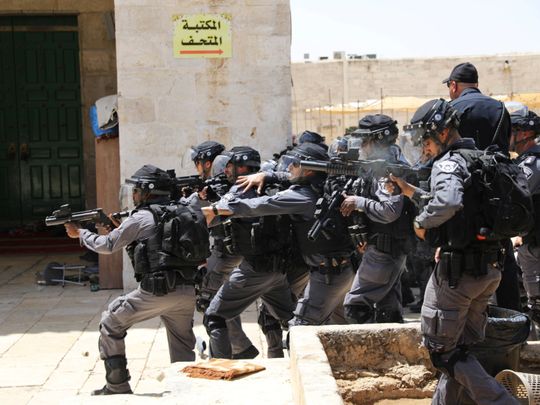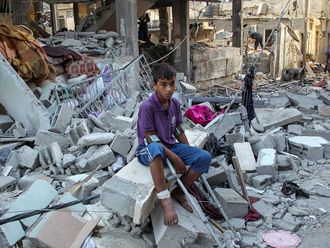
The United States and Israel have made it clear that they have no intention of ratifying the Rome Statute.
Israel, in particular, is finding itself vulnerable to International Criminal Court (ICC) prosecution. Its crimes against Palestinians are brazen, well documented and recurring. Now that Palestine has joined the ICC, Israel is finding itself in a legal bind.
Furthermore, the Rome Statute — the legal foundation of the ICC — seems to be tailored around the kind of crimes that Israel is boldly committing.
Article 5, for example, describes the “serious crimes”, which the ICC is responsible for investigating. These crimes include “(a) The crime of genocide; (b) Crimes against humanity; (c) War crimes; (d) The crime of aggression.”
Israel has been accused of at least two of these crimes — war crimes and crimes against humanity. The last time such an accusation was levied was last February when the United Nations Independent Commission of Inquiry issued its report concluding that Israeli violations “may constitute war crimes or crimes against humanity”.
Israel keeps pedalling tired ideas that do not stand the scrutiny of international law. The chief military Advocate General of the Israeli army, Sharon Afek, and the US Department of Defence General Counsel, Paul Ney, did exactly that when they shared a platform at the ‘International Conference on the Law of Armed Conflict’ which took place in Herzliya, Israel, between May 28-30.
Both Afek and Ney agreed on many things including that Israel and the US have ‘clean hands’ in all of their military conflicts and that they will always be united against any attempt to hold them accountable for war crimes by the ICC.
Absolving Israeli soldiers in advance
A few days before the Herzliya conference, Afek addressed the Israel Bar Association convention in Eilat on May 26. There too, he made ludicrous claims practically absolving, in advance, Israeli soldiers who kill Palestinians.
“A soldier who is in a life-threatening situation and acts to defend himself (or) others (he) is responsible for, is receiving and will continue receiving full backup” from the Israeli army, he said.
The above assertion would appear far more sinister once we keep in mind Afek’s views on what constitutes a “life-threatening situation” as he articulated in Herzliya a few days later.
“Thousands of Gaza’s residents [try] to breach the border fence,” he said, in reference to the non-violent March of Return at the fence separating besieged Gaza from Israel, adding that the Gaza protesters “are led by a terrorist organisation that deliberately uses civilians to carry out attacks”.
In other words, Afek sees unarmed protests in Gaza as a form of terrorism, thus concurring with an earlier statement made by then-Israeli defence minister, Avigdor Lieberman, on April 8, 2018, when he declared that “there are no innocents in Gaza.”
Israel’s ‘shoot to kill’ policy, however, is not confined to the Gaza Strip but is also implemented with the same degree of violent enthusiasm in the occupied West Bank.
Unlike democratic political systems everywhere, in Israel the occupation soldier becomes the interpreter and enforcer of the law.
In his attack on the ICC in the Herzliya conference, Afek contended that, “Israel is a law-abiding country, with an independent and strong judicial system, and there is no reason for its actions to be scrutinised by the ICC.” The Israeli general goes on to reprimand the ICC by urging it to focus on “dealing with the main issues for which it was founded”.
The Rome Statute’s first article states that the ICC has the “power to exercise its jurisdiction over persons for the most serious crimes of international concern, as referred to in this Statute”.
Afek may argue, as he has often done, that none of this is relevant to Israel, for the latter is not “a party to the Rome Statute,” therefore, does not fall within ICC’s legal jurisdiction.
In fact, Article 12 of the Rome Statute allows for ICC’s jurisdiction in two cases: first, if the state in which the alleged crime has occurred is itself a party of the Statute and second, if the state where the crime has occurred agrees to submit itself to the jurisdiction of the court.
While it is true that Israel is not a signatory of the Rome Statute, Palestine has, as of April 2015, agreed to submit itself to the ICC’s jurisdiction. Palestine’s decision allows the court to investigate crimes committed in the Occupied Territories since June 13, 2014, which include the Israeli war on Gaza in July-August of the same year.
Israeli war crimes must not go unpunished. ICC has the legal right and moral duty to carry out the will of the international community and hold those responsible for war crimes, anywhere, including Israel, to account.
Ramzy Baroud is a journalist, author and editor of Palestine Chronicle. His latest book is The Last Earth: A Palestinian Story (Pluto Press, 2018).








